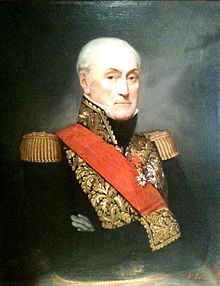Joseph Souham
Joseph Souham ( Comte since 1810 ) (born April 30, 1760 in Lubersac , † April 28, 1837 in Versailles ) was a French officer during the coalition wars .
Life
He came from a noble family and joined the French cavalry at a young age in 1784. After the beginning of the first coalition war , he became the commander of a volunteer battalion in 1792 and rose rapidly as a result. In 1794 he was division general under Pichegru and was instrumental in the Battle of Tourcoing on the French side . His further rise was slowed down by his passion for gaming but also by a lack of strategic talent. In 1799 he served under Jourdan and 1800 under Moreau in Germany. He was involved in the 1804 trial against Moreau and Pichegru and was temporarily imprisoned. After that, he was initially no longer in command before he was sent to the Spanish theater of war in 1808 and distinguished himself on various occasions. Napoleon appointed him count in 1810. In 1812 he took command of the Portuguese Army and helped lift the siege of Burgos .
During the Wars of Liberation in 1813 he commanded the first division of the Ney Corps . He distinguished himself in the battle of Lützen and received the Grand Cross of the Legion of Honor . In the autumn of 1813, due to the absence of Ney, he was in command of his corps. With this he came too late for the battle of the Katzbach and also made other mistakes, which contributed to the defeat and high losses of the army under Macdonald . As a result, his division in Silesia suffered such high losses that it was disbanded. In the Battle of the Nations in Leipzig , he again commanded the Ney corps because it had taken over command of the left wing of the entire army. He was slightly wounded in the battle.
In 1814 he organized a reserve division. This is what Napoleon hoped for after the occupation of Paris by the Allies. Souham and his line manager switched sides. The soldiers rebelled against this and Souham had to flee. During the reign of the hundred days he kept in hiding. After the second restoration, he became inspector general of the infantry in 1816 and governor of the fifth military division in 1818. In 1832 he retired.
literature
- The generals of the republic and the empire. Leipzig 1846, pp. 423-425
- Bernhard von Poten (Ed.): Concise dictionary of the entire military sciences. Volume 9, Bielefeld and Leipzig 1880, p. 18
| personal data | |
|---|---|
| SURNAME | Souham, Joseph |
| BRIEF DESCRIPTION | French general |
| DATE OF BIRTH | April 30, 1760 |
| PLACE OF BIRTH | Lubersac |
| DATE OF DEATH | April 28, 1837 |
| Place of death | Versailles |

